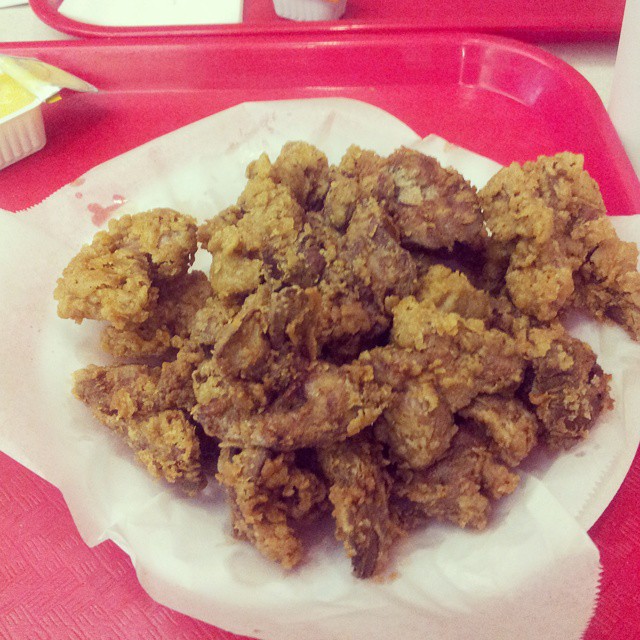By Eliza Williams, 2014
We dropped our bags in the room and collapsed onto the bed. After a long day of driving and seeking out the best of the best in the three towns we visited along Highway 64 Taylor and I were tired, but most importantly – hungry. Knowing nothing about the town of Plymouth where we stopped for the night, the two of us slugged our way back to the front desk to consult our new friend, Matt, for any viable dining suggestions. With a small variety available to us, we hopped in the car and drove down the road to the Golden Skillet, a restaurant that caters to Southern cuisine, however strange it may be.
Inspired by a recent class in which we had watched an episode of Anthony Bourdain: No Reservations, I decided I was putting my taste buds to the test. Slowly, we approached the cashier, a jovial high-school age girl with a Southern twang name Phyllis. Not having a clue what half of the dishes on the menu were, Phyllis gave us some advice on some of the locals’ favorites. A Maryland native, and lover of seafood of course, Taylor chose a “fish n’ chips” meal – far from the British version, I would venture to say. When I asked what “livers and gizzards” were, Phyllis was stunned that neither of us had never heard of livers and gizzards, one of the menu options. After a while of indecisive banter with Phyllis and Taylor, I threw the towel in and chose something that was as foreign to me as it’s name indicated – Livers and Gizzards.
Now, I would like to think I know a thing or two about cuisine; however, I really had no idea what had just come out of my mouth, let alone, what I had consciously decided to dine on that evening. From the title I gathered that livers would be appearing on my plate along with…gizzards? Whatever those are.
Phyllis kindly told us that she would bring us our food when it was ready, and so we went to a table with enough space for us to spread out and work on transcribing our notes for the day. Surely enough, Phyllis appeared not too long after with a tray of food. Taylor dug in without any hesitation. I, on the other hand, examined my food for a minute but then, realizing that I had chosen this path for myself, picked up one of the fried “chicken parts,” as I later learned they were, and took a bite. It had a soft and chewy texture and looked as though it was darker meat than the other pieces scattering my plate. The taste was somewhat bitter and I decided that it was not my favorite. Without being able to tell a true difference, I picked up another larger piece. By examining it it appeared to me that this was a lighter meat. Not only were my instincts on spot but this piece was so tough to eat that Taylor had about finished her meal when I was barely half way done!
Our kind friend Phyllis came over to check on how we were liking our food and educated me on which were the livers and which were the gizzards. The gizzards, as it turned out, were the more tough pieces; I assumed that they were comprised mostly of some sort of muscle from the chicken. Apparently the gizzard is a part of the chicken that is found in its throat, hence all the muscle. The livers are, well, you can guess. I don’t know how they acquire these “parts” but all I can say is thank goodness they fry them because I don’t know how anyone would willingly put them in their mouth otherwise. While I wasn’t a huge fan of the livers, the gizzards were not terrible – despite the fact that it took me about 15 minutes to eat two full ones. This new food experience made my admiration for Anthony Bourdain much, much greater. Perhaps I was not a huge fan of livers and gizzards but, I’m still alive so, that says something. Right?
If you are in the area and looking for a great place to try some foods foreign to your taste buds, check out the Golden Skillet in Plymouth, NC. Ask for Phyllis – I’m sure she’ll remember us.

